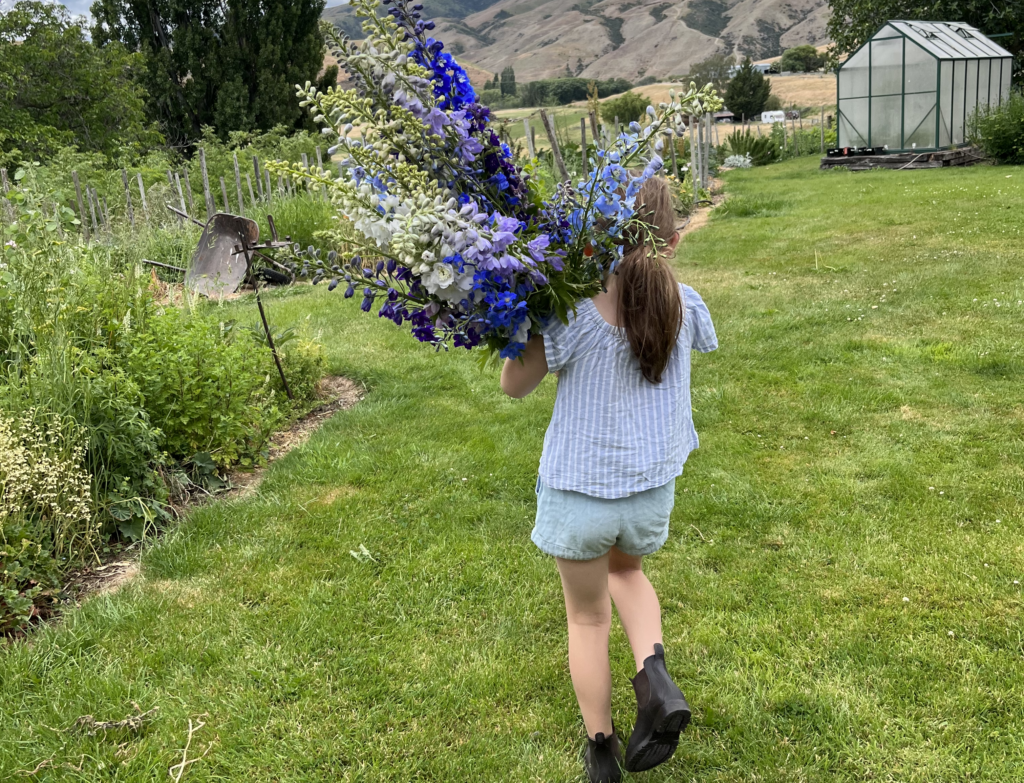Raised on a Merino sheep station at the bottom of Lindis Pass, Sarah Rutherford is no stranger to getting her hands dirty.
On her family’s massive 5500 hectare farm, she would often get in the garden with her mother while growing up.
“My mum’s family were all really into gardening.
“I was never a passionate gardener, but I just loved gardens and flowers and helped Mum in the garden, growing up on the farm.”
The farm has been in her family from her mother’s side for over a century – her brother Tim and father Alastair run the stock now.
But tucked away at the end of her parent’s vegetable garden is a world of its own. It’s Sarah’s world of flowers and blooms. She is The Joy Farmer, and sells her flowers locally.
Since changing lanes in 2020, she has become an artisanal flower farmer and feels more at home in this occupation than she did in the Australian stock market, she said.
“I was in suits, high heels, dealing with executives, so a vast difference. When I came back to Wānaka, what I did as an accountant didn’t really exist here.”
Rutherford had a successful career in both London and Sydney as a chartered accountant working for Cadbury and Stocklands. She enjoyed the city life and even had a doorman at one of her offices in Central London.

“In Berkeley Square it was pretty awesome. We were in this beautiful old house with a doorman who would greet us.”
But the pull of home, the open country and fresh flowers was too much to resist.
During the pandemic she was unsure what her future as an accountant had in store for her, so she quietly started to plant, grow and sell blooms from her Joy Farmer Instagram account and at a tiny stall in Tarras, Central Otago.
“For me it was never meant to become a business, I was just doing it as a side thing. I just started this as a little play.”
As an accountant, the figures would have to add up for her to continue. And they do, just. But the job gives her more flexibility to be present for her seven-year-old daughter, while her partner’s job as a lawyer is more stringent.
“When people say they want to do it [grow flowers] as a job, I just say think very carefully about what you want to get out of it. Because you can make money out of it, but to make it a full-time job you have to be going pretty hard.”
The flower industry in New Zealand has hundreds of independent growers and many still popping up around rural NZ. The New Zealand Flower collective lists where you can buy local flowers at a place near you: some sell from the farm gate; some use the blooms as a hobby; and others sell wholesale.
Since her business sprouted, Rutherford has concentrated on seasonal selling.
“My focus is all about local and getting back to seasonal flowers. Flowers are a bit like food; you can go online and pretty much order whatever you want whenever you want and get things out of season.”
What a lot of customers don’t realise when buying from florists is that some of the flowers are imported. This is needed, as Kiwi growers cannot cater the full amount, but if you buy seasonally, you are more certain to be buying from NZ flower farmers.
“I was so unaware that roses were shipped from Columbia and get chemically treated when they come into the country for biosecurity … would you want that on your kitchen table?
“I think there is a way of thinking about flowers and choices when you consume them. Consider that maybe you just get what’s in season and what is actually grown locally because it will sit better in the environment.”

While hothouses don’t get the storm damage that smaller flower farmers get, there are environmental question marks around them.
The prices for domestic and international flowers are often similar. Those at the farm gate can often be cheaper, but these growers aren’t usually looking to make a huge margin.
“People expect farmgate flowers to be heaps cheaper, but in a lot of ways they are more expensive to produce.
“A lot of people selling at the farm gate aren’t trying to make a profit there. It is artisan – you are doing a small amount of everything and learning to grow multiple varieties and you get so much wastage.”
Since taking up flower farming Rutherford has got in touch with her creative side, which is new for the financially minded grower.
“Obviously as an accountant you are not typically considered creative. I love it. It combines all the things I love: science, business and creativity.”
She said the industry has been welcoming and providing flowers for events such as weddings and hens parties has been the highlight.
“The people, even if you are dealing with someone that is grieving you are still bringing a little bit of comfort or joy to their day.”
Her next project will be “flower parties”.
“A lot of people don’t have gardens and they want to play with flowers so I thought [about] hen’s parties, kids’ birthday parties – give them [customers] the tools and their flowers and they take it to their venue and they can make their bouquets.”
Would a flower farmer have a favourite type?
“I love scented flowers, I have always loved roses. But I fall in love with a different flower every week.”
More: The Farmers Weekly Rural Living series highlights the rich diversity and people of Aotearoa New Zealand’s rural communities, farming families and contributions to the food and fibre sector.










